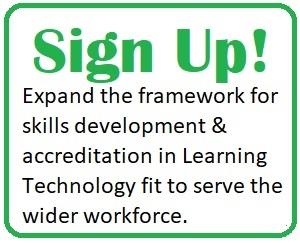Digital Skills development in the workforce

As chief executive of ALT one of the questions I think about most is how we work in learning, teaching and assessment, what skills we need to do our jobs well and how we develop and recognise those skills. ALT’s work is usually focused on a specific group of professionals, those with Learning Technology as part of their role. But as Learning Technology becomes a bigger part of what institutions do, more and more roles develop a Learning Technology component and more expertise is needed. The results of ALT’s Annual Survey, for example, highlights a trend for more senior roles with a focus on Learning Technology as well as an overall increase.
In the Further Education sector in particular, the challenges we are facing to upskills and support teachers, leaders and support staff so that they are able to make intelligent use of Learning Technology are significant.
One of the largest initiatives to address this issue is a range of free, open courses called Blended Learning Essentials, which are funded by the Ufi Trust. The most recent course launch prompted a response from
 Minister for Digital, Matthew Hancock, who said:
Minister for Digital, Matthew Hancock, who said:
We want everybody to have access to all the benefits digital technology can bring, so I’m delighted Ufi is expanding its hugely popular Blended Learning Essentials (BLE) Programme to help increase the digital skills of those teaching and learning on vocational courses. I pay tribute to everyone who’s working so hard on this agenda, to try to make sure everyone gets the chance to fulfil their true potential.
The course is aimed at providing flexible skills development that recognises the importance of making effective use of technology and in particular tools and platforms that are commonly used by learners. The course aims to enable you, as a teacher or trainer to develop your learners’ digital skills for successful employment and progress in the modern workplace. Through real-life case studies, resources and practical support you’ll be able to help your learners manage their online identity and digital information required for their work. We’ll show you how to assist learners to create digital content and provide you with tools for communicating effectively and working collaboratively.
Predictions about what the future of technology in education looks like rarely come true. What we know for certain, however, is that an increasing proportion of the workforce, including decision makers, have Learning Technology as part of their role and require meaningful, flexible recognition that doesn’t become obsolete as soon as a new technology is introduced or a contract changes hands.
As the leading professional body for Learning Technology, ALT for example offers a pathway to further accreditation from the Blended Learning Essentials courses which is based on core competencies in areas that remain relevant regardless of how technology changes, key areas which are important for the professional development of all Learning Technology professionals:
- Communication, which includes collaboration and working with others
- Policy & strategy, in short, the wider context in which we work and the forces that shape it
- Operations, focusing on technical implementation, constraints and users
- Teaching, learning and assessment in all contexts.
F or FE, CMALT accreditation presents a pathway to professional recognition and development independent of the tools or technologies currently in use while providing scope to include specialist skills and experience. Yet as Learning Technology’s role expands, we also need to expand ways in which recognition is gained and thus we have recently launched a new project called ‘Pathways to CMALT’. This new project will pilot two new CMALT strands, one for early career candidates, and one for candidates in senior and leadership roles.
or FE, CMALT accreditation presents a pathway to professional recognition and development independent of the tools or technologies currently in use while providing scope to include specialist skills and experience. Yet as Learning Technology’s role expands, we also need to expand ways in which recognition is gained and thus we have recently launched a new project called ‘Pathways to CMALT’. This new project will pilot two new CMALT strands, one for early career candidates, and one for candidates in senior and leadership roles.
One of the strengths of the CMALT framework is that it is based on peer-assessment and as such the body of accredited portfolios establishes a robust and continuously developing body of evidence, which helps define standards for professional practice. One of the outcomes of ‘Pathways to CMALT’ will be to build a body of examples that help benchmark different professional roles and career paths.
We are particularly interested for volunteers from colleges, training and apprenticeship providers to participate in this important initiative and invite you to sign up to help us expand the framework for skills development and accreditation in Learning Technology fit to serve the wider workforce.
Dr Maren Deepwell, Chief Executive of the Association for Learning Technology
About Association for Learning Technology (ALT): ALT represents 2500+ Members from across sectors and is an independent charity est. 1993 (Registered charity number: 1160039).

Responses